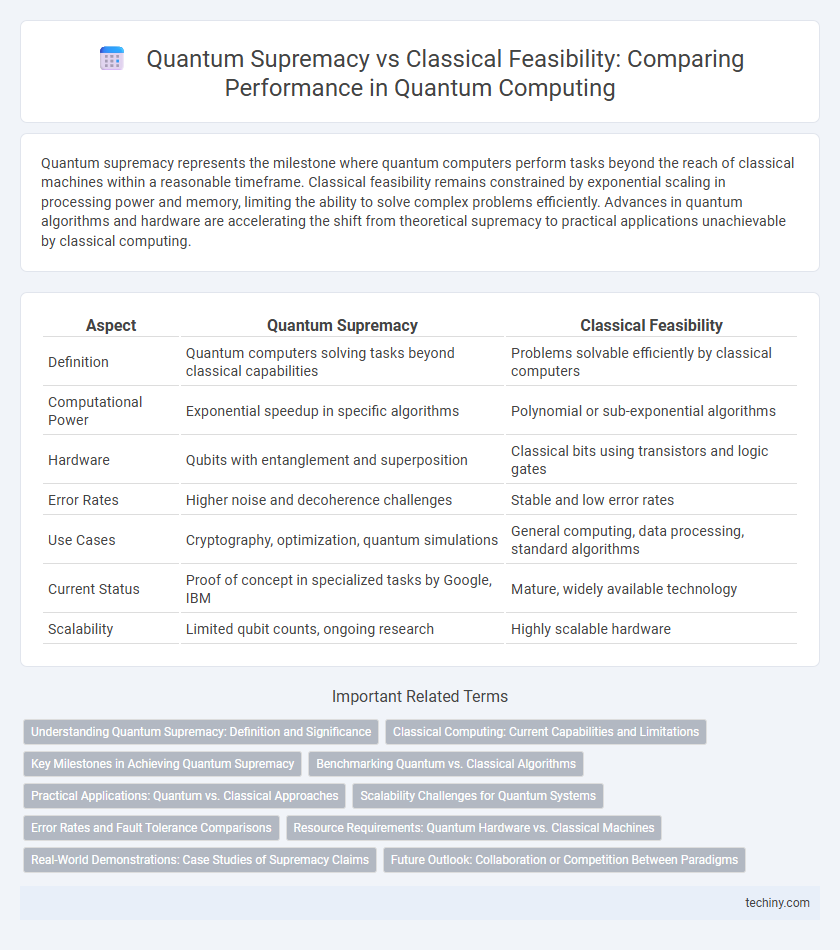Quantum supremacy represents the milestone where quantum computers perform tasks beyond the reach of classical machines within a reasonable timeframe. Classical feasibility remains constrained by exponential scaling in processing power and memory, limiting the ability to solve complex problems efficiently. Advances in quantum algorithms and hardware are accelerating the shift from theoretical supremacy to practical applications unachievable by classical computing.
Table of Comparison
| Aspect | Quantum Supremacy | Classical Feasibility |
|---|---|---|
| Definition | Quantum computers solving tasks beyond classical capabilities | Problems solvable efficiently by classical computers |
| Computational Power | Exponential speedup in specific algorithms | Polynomial or sub-exponential algorithms |
| Hardware | Qubits with entanglement and superposition | Classical bits using transistors and logic gates |
| Error Rates | Higher noise and decoherence challenges | Stable and low error rates |
| Use Cases | Cryptography, optimization, quantum simulations | General computing, data processing, standard algorithms |
| Current Status | Proof of concept in specialized tasks by Google, IBM | Mature, widely available technology |
| Scalability | Limited qubit counts, ongoing research | Highly scalable hardware |
Understanding Quantum Supremacy: Definition and Significance
Quantum supremacy refers to the milestone where quantum computers perform tasks beyond the reach of classical supercomputers, demonstrating their unique computational advantages. This concept is significant because it showcases problems intractable for classical algorithms, such as specific sampling or optimization tasks, highlighting the exponential speedup potential inherent in quantum processors. Understanding quantum supremacy helps define practical boundaries between classical feasibility and quantum advantage, guiding future developments in quantum algorithm design and hardware scalability.
Classical Computing: Current Capabilities and Limitations
Classical computing excels at executing well-defined algorithms with high speed on large-scale problems, leveraging advanced CPUs and GPUs optimized for parallel processing. However, classical systems face exponential slowdowns when tackling complex quantum simulations or factorization tasks due to inherent binary architecture limitations. Despite significant advancements in classical hardware, certain problems remain computationally infeasible, highlighting the potential advantage of quantum supremacy in specialized domains.
Key Milestones in Achieving Quantum Supremacy
Quantum supremacy was first achieved in 2019 when Google's Sycamore processor performed a specific computational task in 200 seconds, which would take the fastest classical supercomputers approximately 10,000 years. IBM contested this claim by demonstrating a classical algorithm that could perform the same task in 2.5 days on a classical system, highlighting the ongoing debate about classical feasibility. Key milestones include the development of quantum error correction, improvements in qubit coherence times, and optimization of quantum circuits, all crucial for scaling quantum advantage beyond specialized tasks to general-purpose applications.
Benchmarking Quantum vs. Classical Algorithms
Benchmarking quantum algorithms against classical counterparts involves evaluating their performance on specific problem instances that highlight quantum advantages, such as Shor's algorithm for integer factorization or quantum simulation tasks. Quantum supremacy is demonstrated when a quantum processor solves a problem infeasible for the best-known classical algorithms within a reasonable timeframe, often verified through randomized circuit sampling experiments. Classical feasibility remains critical as it defines the threshold problems where quantum benefit emerges, guiding algorithmic improvements and hardware development in quantum computing.
Practical Applications: Quantum vs. Classical Approaches
Quantum supremacy demonstrates a quantum computer's ability to solve specific problems exponentially faster than classical computers, but many practical applications still favor classical feasibility due to scalability and error rates. Quantum algorithms like Shor's for factoring and Grover's for search offer significant speedups, yet current quantum hardware limits widespread adoption in real-world scenarios. Classical methods retain advantages in optimization, simulation, and machine learning tasks where robustness and reliability are crucial.
Scalability Challenges for Quantum Systems
Quantum computing faces significant scalability challenges that hinder achieving quantum supremacy over classical systems due to qubit coherence, error rates, and control precision limitations. The complexity of maintaining entanglement across increasing qubit counts while minimizing noise and decoherence restricts effective quantum error correction and fault-tolerant operation. Classical feasibility remains competitive because classical supercomputers continue to advance in addressing combinatorial problems, whereas large-scale quantum systems require breakthroughs in qubit architecture and quantum gate fidelity to surpass classical limits.
Error Rates and Fault Tolerance Comparisons
Quantum supremacy demonstrates quantum computers solving specific problems exponentially faster than classical computers, yet high error rates remain a significant obstacle to practical applications. Classical systems benefit from mature fault tolerance techniques, while quantum error correction requires complex schemes like surface codes that demand substantial qubit overhead. Balancing error rates and fault tolerance advances is crucial for transitioning from theoretical quantum advantage to feasible real-world computations.
Resource Requirements: Quantum Hardware vs. Classical Machines
Quantum supremacy is characterized by quantum processors performing tasks that classical machines cannot achieve within a reasonable timeframe, often due to the exponential scaling of quantum states. Quantum hardware requires maintaining coherence and error correction at a scale that surpasses classical resource demands, with qubits and gate fidelity as critical metrics. Classical machines face computational infeasibility with problems involving high-dimensional state spaces, while quantum devices leverage superposition and entanglement to optimize resource usage despite current hardware limitations.
Real-World Demonstrations: Case Studies of Supremacy Claims
Real-world demonstrations of quantum supremacy, such as Google's Sycamore processor completing a complex sampling task exponentially faster than classical supercomputers, highlight significant milestones in quantum computing capabilities. IBM and other classical computing proponents challenge some supremacy claims by emphasizing algorithmic optimizations and error corrections that enhance classical feasibility for specific tasks. These case studies underscore the ongoing debate and the nuanced boundary where quantum advantages emerge over classical computational models in practical applications.
Future Outlook: Collaboration or Competition Between Paradigms
Quantum supremacy marks a critical milestone where quantum computers outperform classical counterparts on specific tasks, yet classical feasibility remains strong due to ongoing algorithmic improvements and hardware optimization. Future outlooks suggest a hybrid approach leveraging quantum-classical collaboration might accelerate breakthroughs, combining quantum advantage with classical scalability. Research environments increasingly prioritize interdisciplinary efforts to integrate quantum processors into existing classical infrastructures, aiming to maximize computational potential rather than foster strict competition.
quantum supremacy vs classical feasibility Infographic

 techiny.com
techiny.com